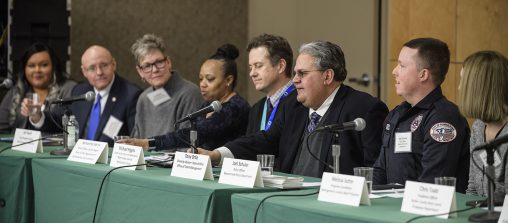
Wright State students interested in criminal justice careers interacted with alumni and other professionals who have flourished in those fields at the Crime and Justice Alumni Panel and Program on Feb. 19. (Photo by Erin Pence)
Wright State University students interested in law enforcement, corrections, probation and other careers in criminal justice got a chance to interact with alumni and other professionals who have flourished in those fields.
Ten enthusiastic participants shared their insights with students as part of the Crime and Justice Alumni Panel and Program held Feb. 19 in the Millett Hall Atrium.
Organizer Wayne Stark, director of workforce development for the Center for Liberal Arts Student Success (CLASS) in the College of Liberal Arts and career consultant with the Wright State Career Center, said the program is part of an on-going effort to offer targeted resources for students through a series of field and major career events.
“They may be interested in being a corrections officer, a probation officer or interested in working for the State of Ohio in a variety of capacities,” said Stark. “Based on previous events of this sort, I know they will make substantive connections that will result in opportunities — whether they are internships, full-time jobs, mentoring or networking possibilities.”
The panelists told the students the joys of the criminal justice field include helping people overcome obstacles and making a difference in their lives; having the freedom to make important decisions; developing a strong camaraderie with fellow workers; helping military veterans get their benefits; and having the powerful satisfaction of doing public service.
The panelists said negatives can include emotionally draining experiences; being the targets of criticism; witnessing traumatic events; fatigue including having to work night shifts; and having to sometimes watch people fail.
Career advice included getting involved early in networking and building relationships; being prepared for job interviews; having letters of reference; and being willing to take entry-level jobs.
Once hired, panelists said, be passionate about the job; go the extra mile and take on challenging tasks co-workers avoid; think outside the box; learn how to communicate well; follow the rules; and treat everyone with respect.
Several panelists cautioned students to be careful about what they post on social media because employers are making increasing use of that in hiring decisions.
The panelists were Karen Bleise, corrections officer at the Dayton Correctional Institution; Lloyd Early, special agent-in-charge of the Ohio Attorney General’s Medicaid Fraud Control Unit; Jan Gault, chief probation officer for Clark County Juvenile Court; Samantha Harris, parole officer with the Ohio Department of Rehabilitation and Corrections; Michael Higgins, director of corrections and rehabilitation at the Miami Valley Juvenile Rehabilitation Center; Tony Ortiz, diversity liaison for the Ohio Office of Talent Management; Joel Schuler, police officer with the Beavercreek Police Department; Melissa Sutter, program coordinator for Montgomery County Adult Probation; Chris Todd, probation officer for the Butler County Area Courts Probation Department; and Kyla Woods, family services manager for Montgomery County Juvenile Court/Probation Services.
The program, which was sponsored by CLASS and the Crime and Justice Studies Program, concluded with a networking session between the panelists and students, who represented a variety of majors and all class levels, including graduate students. Stark said the program was also a great opportunity to create a synergy among alumni, faculty and representatives of the College of Liberal Arts and the Career Center.

 Walking through open doors
Walking through open doors  Adventures await
Adventures await  Wright State to expand nursing facilities to meet workforce needs and prepare more graduates for in-demand careers
Wright State to expand nursing facilities to meet workforce needs and prepare more graduates for in-demand careers  Wright State student-athletes make a lasting impact on local family with more to come
Wright State student-athletes make a lasting impact on local family with more to come  Wright State names Rajneesh Suri dean of Raj Soin College of Business
Wright State names Rajneesh Suri dean of Raj Soin College of Business 